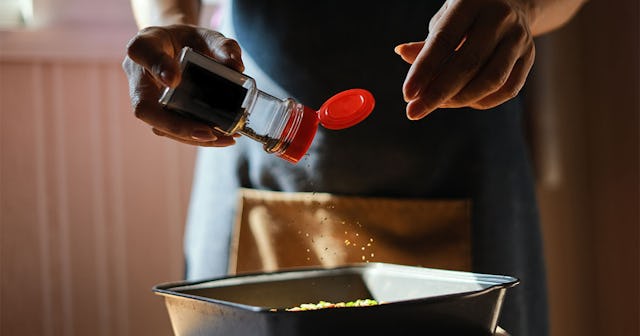If You’re Worried About The Presence Of Lead In Your House, Look In Your Spice Cabinet

Between the pandemic, climate change, gun violence, and just an all around feeling that the world has gone mad, I’m not sure I can take adding another thing to my WTAF list. But here we are…
It turns out that certain spices in our kitchen cabinets—you know, the spices we use to jazz up our food, and make our lives a little more delightful and slightly less horrible—have high levels of lead and other harmful heavy metals. These levels might be high enough to cause health issues in our kids, and even ourselves.
Yes, really. Sorry to be the bearer of yet more crappy news.
So here’s the gist. Consumer Reports went ahead and tested a bunch of common spices—126 products put out by brands we all trust and love like Trader Joes, McCormick, Spice Island, Walmart, and Whole Foods. They found that about one third of these products have questionable levels of heavy metals.
“Roughly one-third of the tested products, 40 in total, had high enough levels of arsenic, lead, and cadmium combined, on average, to pose a health concern for children when regularly consumed in typical serving sizes,” a write-up from Consumer Reports read. “Most raised concern for adults, too.”
Of particular concern were the herbs thyme and oregano. Basically every product containing these herbs at high levels of heavy metals. I don’t know about you, but my kids consume a lot of Italian seasoning. Pizza, pizza bagels, pizza pockets … you name it (yes, my kids eat a lot of pizza!).
In 31 products, levels of these dangerous heavy metals were so high that they “exceeded the maximum amount anyone should have in a day,” according to Consumer Reports. AND, if all of this wasn’t bad enough, in many of these products, it didn’t matter what brand it was, or if it was organic, made in the USA, etc. They all just had high levels of harmful heavy metals.
Okay, phew. This all sucks. But how exactly does it apply to you? Do you basically just throw out all your herbs and spices and move to the middle of nowhere so you can grow everything yourself? Well, not so fast.
First of all, besides thyme and oregano (which, maybe we do all need to start growing ourselves?), there were spices in every category that were okay (you can read more about what spices they tested, and some of the results, here.) There were some spices that tested consistently lower in heavy metals, including black pepper, garlic powder, sesame seeds, coriander, and curry. We use a lot of garlic powder around here, so that’s a relief.
Also, they found no evidence of salmonella in any of the spices, so I guess that’s something to be happy about. I mean, yeet me off the damn planet if it turns out my spices are full of bacteria. I hadn’t even thought of that as a possibility until now. So, thanks?
James E. Rogers, PhD, director of food safety and testing at Consumer Reports, says that a single serving of spices with the highest content of heavy metals isn’t going to destroy you, so you don’t need to freak about the oregano you sprinkled over your pasta.
But that doesn’t mean you shouldn’t limit some of these spices with the highest levels of heavy metals, especially when we are talking about young kids.
“When people think about heavy metals in their diet, if they do at all, it’s probably the lead in their drinking water or arsenic in their children’s fruit juices or cereals,” Rogers told Consumer Reports. “But our tests show that dried herbs and spices can be a surprising, and worrisome, source for children and adults.”
Besides limiting your consumption of the herbs and brands with the highest levels of heavy metals, other safety precautions mentioned by Consumer Reports include trying not to consume products manufactured outside of the U.S., where there may be less stringent safety precautions.
You should also consider your overall exposure to heavy metals. If you know that your drinking water contains high levels, or that you eat other foods with high levels of lead, you should decrease any other sources of high lead levels, including in your spices.
When it comes to children, remember that other foods besides spices have been known to have high levels of lead, including rice, baby foods, and juices. You should get your child tested for lead at their well visits, according to pediatrician guidelines.
Yes, information about this can make us feel hopeless at times. Even our spices are bad for us?! But knowledge is power, and so learning something like this can be looked at as a good thing, because you can make tweaks to your spice consumption and/or other eating habits so that you can keep your family healthy and well.
Still, I swear, if I hear that one more thing I love is bad for me, I’m gonna just about lose my mind.
This article was originally published on